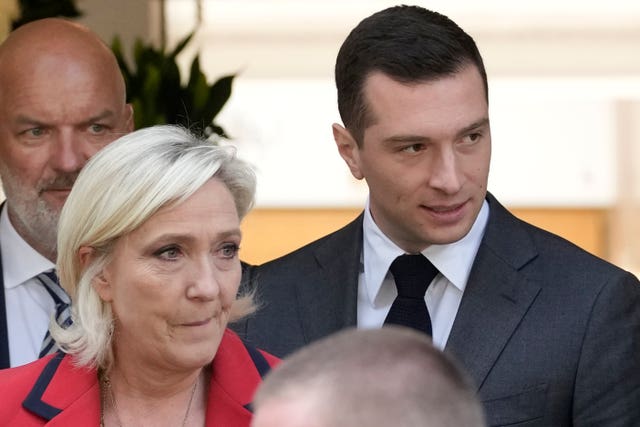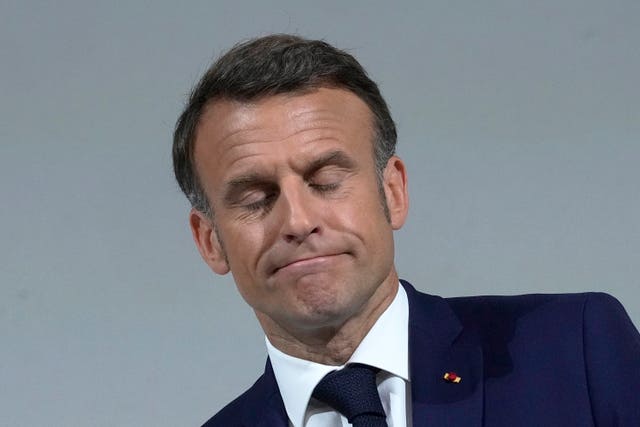
France’s Decisive Second Round of ElectionsFrance’s Decisive Second Round of Elections On Sunday, France will hold its decisive second round of elections. Marine Le Pen’s far-right Rassemblement National could make history by winning, potentially leading to a parliamentary gridlock and political deadlock. These elections have implications for the war in Ukraine, global diplomacy, Europe’s economy, and President Emmanuel Macron’s remaining presidency. The campaign has been marred by racism, anti-Semitism, Russian cyberattacks, and physical assaults on candidates. The government has deployed 30,000 police officers for election day. Amidst Olympic Games and Tour de France preparations, 49 million voters face critical choices. Rassemblement National aims to become the first far-right government since World War II. It won the first round of voting, followed by a coalition of left and Green parties and Macron’s alliance. Polls suggest the party could win the most seats but fall short of a majority. Macron, if he wins, could be forced to share power in a “cohabitation” arrangement. Alternatively, a hung parliament could result, prompting Macron to negotiate with the left or appoint a technocratic government. Either scenario would hinder France’s ability to address key issues like arming Ukraine and reforming its economy. Financial markets are anxious due to the potential uncertainty. Many voters in rural areas are frustrated with economic disparities and blame immigration. Rassemblement National has exploited these frustrations by blaming immigration for France’s problems. Despite softening its positions, Rassemblement National’s core values remain, including limiting citizenship rights and expanding police powers. The second round of voting will conclude at 8pm local time on Sunday in mainland France. Results are expected late Sunday and early Monday. Macron has stated he will remain president until his term ends in 2027, regardless of the outcome.
France heads to the polls on Sunday for a decisive second round of elections. Marine Le Pen’s far-right Rassemblement National and its inward-looking, anti-immigration vision could score a historic victory.
Sunday’s snap elections could also lead to a parliamentary gridlock and years of political deadlock. They could have implications for the war in Ukraine, global diplomacy and Europe’s economic stability.
It is almost certain that they will undermine President Emmanuel Macron for the remaining three years of his presidency.
Racism and anti-Semitism marred the election campaign, along with Russian cyberattacks and more than 50 candidates reported being physically attacked. The government is deploying 30,000 police officers on election day.
 The president of the far-right Rassemblement National party, Jordan Bardella, right, leaves with far-right leader Marine Le Pen after a press conference (AP)
The president of the far-right Rassemblement National party, Jordan Bardella, right, leaves with far-right leader Marine Le Pen after a press conference (AP)
Tensions are rising as France prepares for the Olympic Games and the Tour de France races through the country, Olympic torch in hand.
Meanwhile, 49 million voters are busy with the most important elections in decades.
France could have its first far-right government since the Nazi occupation in World War II if Rassemblement National wins an outright majority and 28-year-old leader Jordan Bardella becomes prime minister.
The party emerged victorious in the first round of voting the week before, followed by a coalition of centre-left, far-left and Green parties, and Macron’s centrist alliance.
The outcome remains highly uncertain.
Polls between the two rounds suggest that the National Rassemblement could win the most seats in the National Assembly with 577 seats, but that it will fall short of the 289 seats needed for a majority.
If Macron wins a majority, he will be forced to share power in an uneasy arrangement known in France as “cohabitation.”
 French President Emmanuel Macron (AP)
French President Emmanuel Macron (AP)
Another possibility is that no party has a majority, resulting in a hung parliament. That could prompt Macron to enter coalition negotiations with the center-left or appoint a technocratic government with no political affiliations.
Both scenarios would be unprecedented for modern France and make it harder for the European Union’s second-largest economy to take bold decisions on arming Ukraine, reforming labor laws or cutting its huge budget deficit.
Financial markets have been nervous since Macron surprised even his closest allies in June by announcing early elections after Rassemblement National won the most seats for France in the European Parliament elections.
Many French voters, especially in small towns and rural areas, are frustrated by low incomes and the fact that the political leadership in Paris is seen as elitist and uninterested in the day-to-day struggles of workers.
Rassemblement National has reached out to these voters, often by blaming immigration for France’s problems. Over the past decade, it has built a broad and deep base of support.
Ms Le Pen has softened many of the party’s positions — she no longer calls for leaving NATO and the EU — to make the party more electable. But the far-right party’s core values remain.
They want a referendum on whether being born in France is enough to get French citizenship, they also want to restrict the rights of people with dual nationality and give the police more freedom to use weapons.
The second round of voting began on Saturday in France’s overseas territories, from the South Pacific to the Caribbean, the Indian Ocean and the North Atlantic.
The election is set to conclude at 8pm local time in mainland France on Sunday. The first poll forecasts are expected on Sunday evening, with early official results expected late Sunday and early Monday.
Whatever happens, Macron said he will not step down and will remain president until his term ends in 2027.